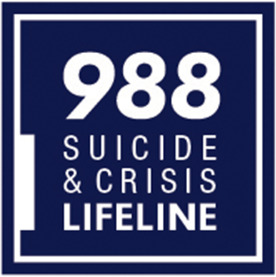
Special to IFN
RALEIGH — The N.C. Department of Health and Human Services recently marked the third anniversary of the 988 Suicide and Crisis Lifeline, which provides help and support for anyone suffering from depression, anxiety or interpersonal/family issues or who just needs someone to talk to during a time of personal crisis.
North Carolina is a national leader in 988 implementation with a focus on answering every call and ensuring every person gets the care they need. A recent survey shows many people reported feeling hopeful, grateful and motivated after calling 988 with more than 90 percent finding the service valuable in their community. Additionally, 33 percent of people in the survey said 988 saved their life or the life of someone they care about.
From August 2022, the first full month of service, through May 2025, the state averaged more than 9,400 calls, texts or chats each month. Text and chat options were first offered in July 2023.
From June 2024 through May 2025, the volume increased to 11,443 calls/chats/texts per month. National data shows 68 percent of contacts are phone calls, 18 percent are texts and 14 percent are chats.
“No matter what you are facing, help is just a phone call away for all North Carolinians,” said N.C. Health and Human Services Secretary Dev Sangvai. “The rapid and successful adoption of 988 is a testament to the need for accessible, compassionate and supportive counselors so someone experiencing a mental health crisis can feel cared for in their most vulnerable moments.”
Mental health impacts every North Carolinian, and rates of anxiety and depression have skyrocketed in recent years. Suicide is the second leading cause of death among young people ages 10 to 14, and a leading cause of death among those ages 15 to 24. Experienced and trained 988 operators will respond to all calls to 988 and ensure that people receive the support and resources that they need.
In North Carolina, the 13-17 age group averages the most contacts to 988, with 97 contacts per 10,000 residents, followed by 25-34 (96), 18-24 (93) and 35-44 (57), according to the most recent data from the North Carolina 988 Performance Dashboard.
“The need for mental health care for young people in North Carolina has never been greater,” said Kelly Crosbie, director of the Division of Mental Health, Substance Use Services and Developmental Disorders. “We are building a system of crisis services to ensure there will always be someone to contact, someone to respond and a safe for help if you are in crisis or just need someone to talk to.”
Experienced and trained 988 operators will respond to all calls and ensure people receive the support and resources they need. The U.S. Department of Health and Human Services recently announced it would eliminate federal funding for the 988 Suicide and Crisis Lifeline service dedicated to LGBTQ+ youth services. On July 17, 2025, people who call 988 will no longer have the option to Press 3, specific to LGBTQ+ youth considering suicide.
NCDHHS is committed to responding to everyone who needs mental health services. Everyone can and should still call 988, including members of the LGBTQ+ community.
The 988 Suicide and Crisis Lifeline is an important component of NCDHHS’ ongoing work to ensure every North Carolinian has someone to contact, someone to respond and a safe place for help when experiencing a behavioral health crisis.
Of the $835 million investment in behavioral health in the 2023 state budget, NCDHHS has committed more than $130 million to transforming North Carolina’s mental health crisis response services and providing support when and where it is needed, no matter the crisis.
The 988 Suicide and Crisis Lifeline is one of many crisis services offered by NCDHHS to those who need support. Mobile crisis teams can come to you to provide in-person help. Find the low or no cost crisis services right for you at ncdhhs.gov/CrisisServices.
Community Crisis Centers are open 24/7 and provide access to licensed clinicians. No appointment is required, and help is available to people ages 4 and up.
The NCDHHS Crisis Services Communications Toolkit includes free flyers, posters and other resources to promote and explain crisis services in your community in English and Spanish. For additional information about 988, visit 988lifeline.org.
Help is Available
If you or someone you know is struggling with their mental health or need someone to talk to, you are not alone. Resources are available on the NCDHHS Suicide Prevention website for social or family situations, depression, anxiety, panic attacks, thoughts of suicide, alcohol or drug use, or if you just need someone to talk to.



